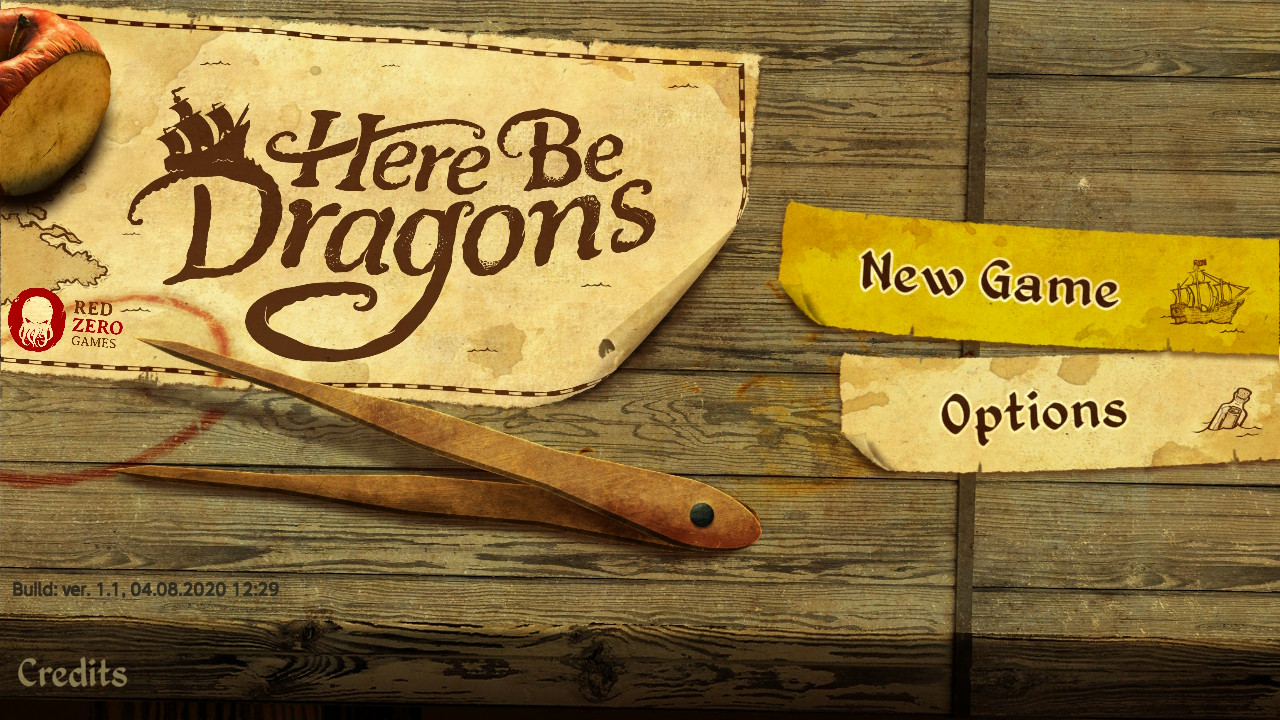[Review] Here Be Dragons – Nintendo Switch
Here Be Dragons
Nintendo Switch
Developed By: Red Zero Games
Published By: Red Zero Games
Category: Board Game, Puzzle, Strategy
Release Date: 09.03.20
Composers: LynneMusic, Will Cooksom
Here Be Dragons for the Nintendo Switch is a game I’m desperate to love for its charming visual style, original premise, and genuinely witty writing – but its gameplay keeps getting in the way. To start, we’ve got a wonderfully illustrated graphical aesthetic that the developers describe as “living map” graphics. It’s an apt description; everything from the battle screen to the cutscenes are colored and designed to appear as though they take place on an ancient treasure map. To keep things fun and enhance the game’s satirical look at the dawn of the Age of Exploration, the ancient map motif is focused through a cartoony lens that fits perfectly with Here Be Dragons’ slapstick romp across the Atlantic.
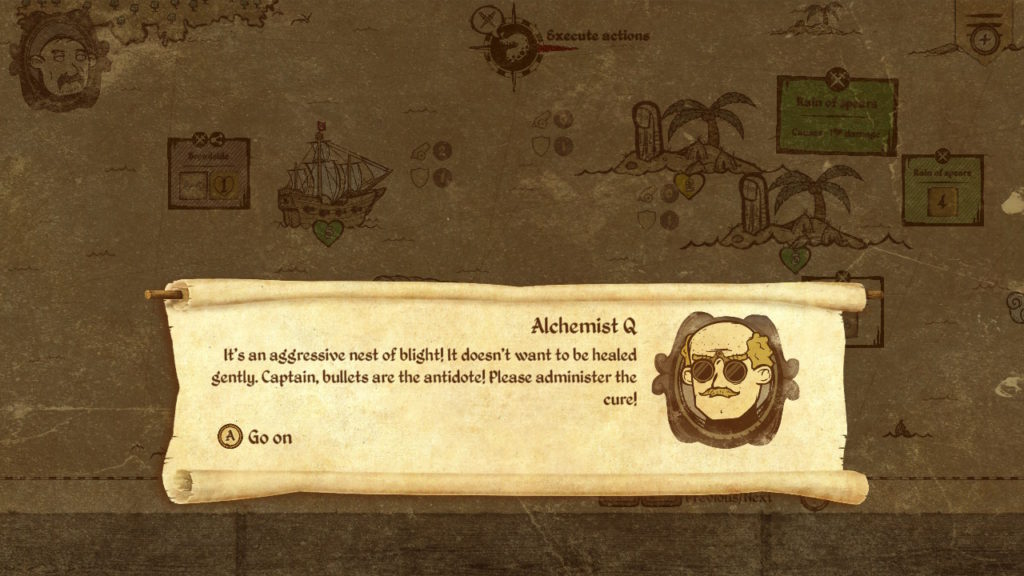
Speaking of the game’s story, it’s just an absolute delight. The year is 1490 – two years before Christopher Columbus set off on his voyage. The Chancellor of Spain is eager to begin exploring the high seas – but not before they’re cleared of some godless monsters, numerous pirates, assorted beasts, and the odd deity or two. Enter the mysterious Alchemist Q – a highly secretive man of questionable moral character and access to a seemingly endless supply of quirky captains clever enough to command an armada, but too oblivious or crazy to notice their benefactor’s sinister underlying intentions. It’s all weaved together in one of the funniest, wittiest, most sharply written game scripts I’ve experienced in quite some time. It’s extremely difficult to write dialogue that conveys a great sense of comedic timing without the aid of voice actors to guide the narrative, but Here Be Dragons’ script does so with a consistent deftness that is genuinely impressive to behold.
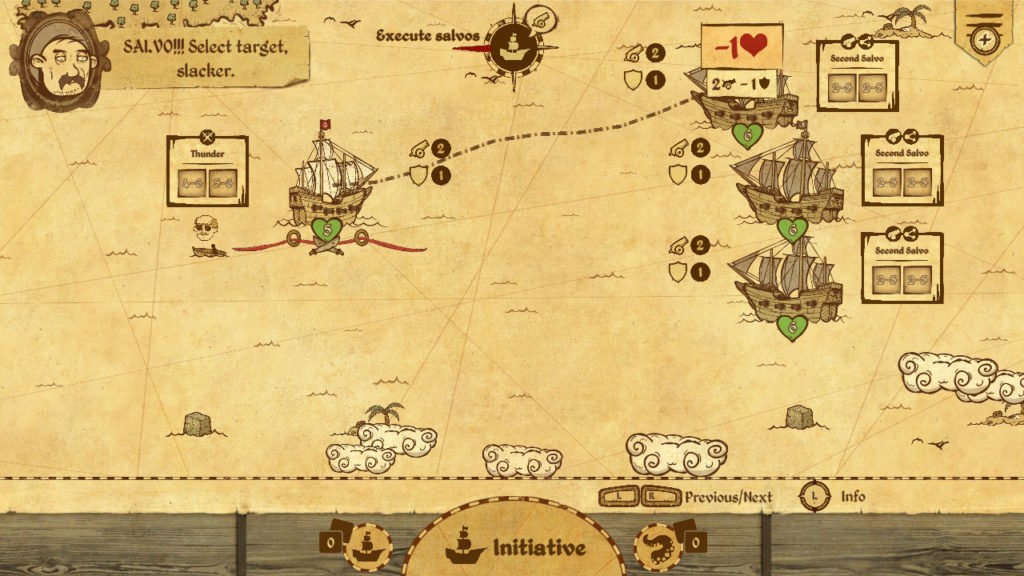
At first glance, Here Be Dragons has a deceptively simple but equally quirky dice-based gameplay concept to match its graphics and story. In every level, players take command of a few ships and square off against a group of enemies ranging from unsuspecting fishermen to the deadly kraken to Neptune himself. Every round of battle starts with the computer rolling a number of six-sided dice equal to the number of surviving combatants. Every character on the battlefield has one or two abilities that require certain dice values to activate. The team with the initiative – which is determined by which player had the lowest total of assigned dice scores the previous turn – gets to assign dice first, and then act first in every phase of the battle. Players can also have dice assignment slots on their attack and defense scores – assigning a die to those slots permanently increases that ships attack or defense score by one. If a player ends their assignment phase without assigning a die to each of their ships, they take damage for each unused die.
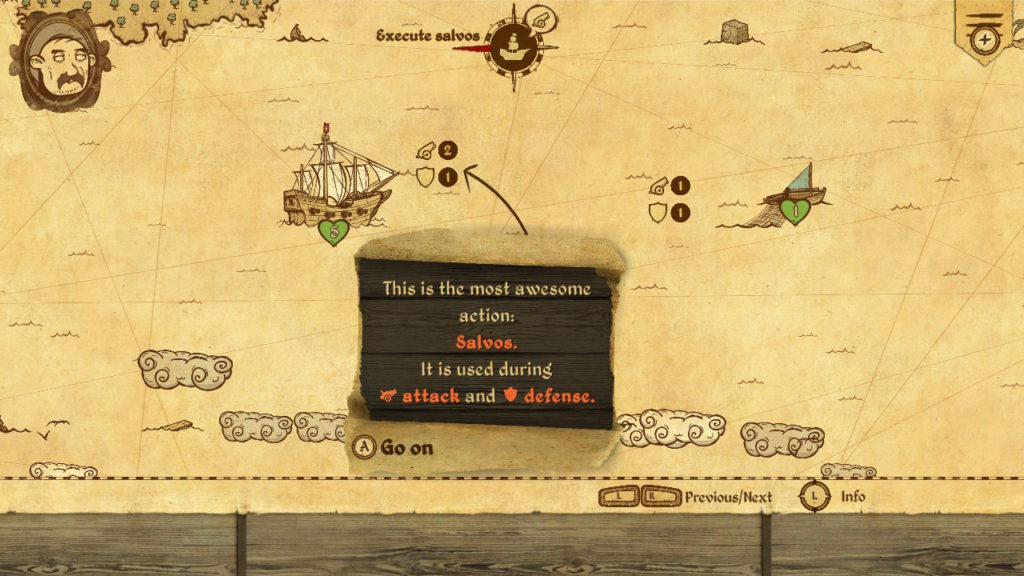
After assigning dice, combat starts in the form of the salvo phase. Again, the player with initiative acts first, and that player can assign their ships’ attacks to whichever enemy or enemies they wish. Damage is calculated by adding up all of the attack scores of each attacker and then subtracting the target’s defense. The final step of every turn is the action phase, where any actions with enough dice assigned to them to activate are resolved. Abilities can do lots of useful stuff, like inflict damage that ignores defense scores, heal your units, or prevent your enemies from taking their turns. Occasionally complicating matters are environmental hazards, like acid seas which cause continuous damage or heavy fog which can preempt the salvo phase if your dice total is odd.
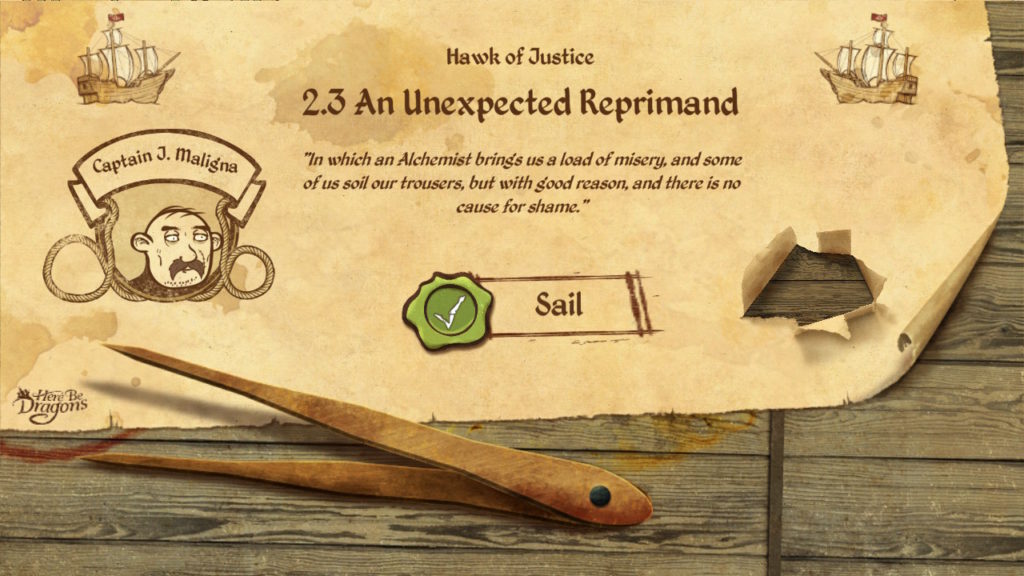
Assigning dice in a way that benefits you in the short term while either maintaining or flipping initiative makes for some fascinating strategizing, and it can get slightly deeper with the introduction of errata. Occasionally ink bottles will appear on the battlefield, and collecting them lets you use errata, which are skills that allow for the manipulation of dice rolls. Errata skills include adding or subtracting a point from a dice roll, rerolling a dice altogether, or just straight up healing some damage to your ships. It’s a pretty cool advantage that the CPU doesn’t have, so it helps to make up for the fact that you’re almost always outnumbered. After most fights, you can also choose an upgrade for each of your ships, which comes in handy… kind of. You get a new roster of ships whenever the chapter shifts to a new captain, so the upgrades are really only effective for one or two battles at a time. It’s better than nothing, but it kind of hurts the game’s sense of progression.
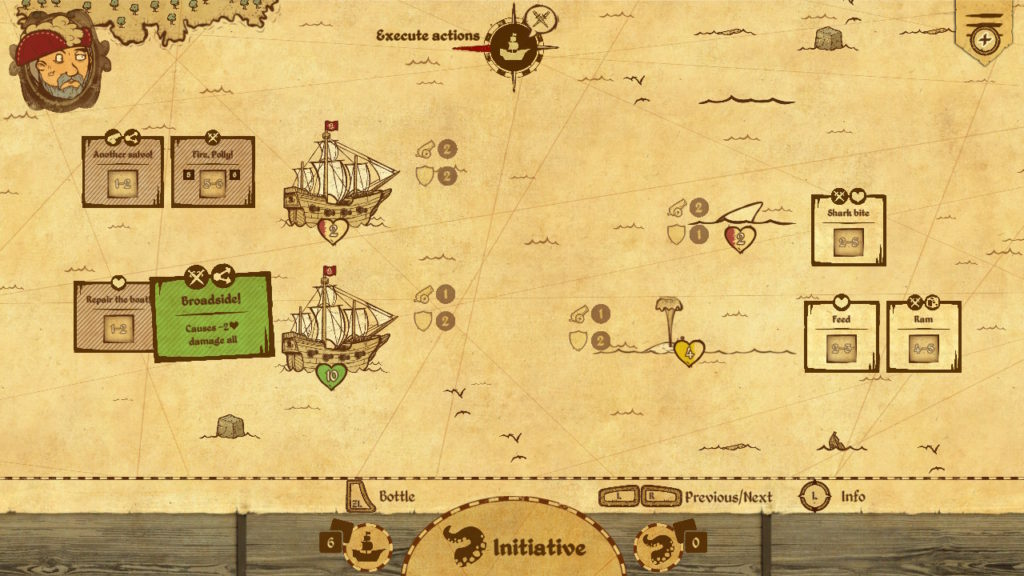
And if a slightly unsatisfying sense of progression was the game’s only issue, I could recommend this game wholeheartedly for anyone who ever enjoyed a video game – and maybe even some people who never have. In the end, though, it succumbs to the same issue I have with any single-player dice game; everything depends on the dice. I just can’t see what is so enjoyable about a single-player experience where player skill is not the determining factor for success. You can assign the dice you roll the best way you’re able every turn, but if the rolls don’t favor your abilities it doesn’t matter how well you strategize; the game’s already lost before you even make a move.
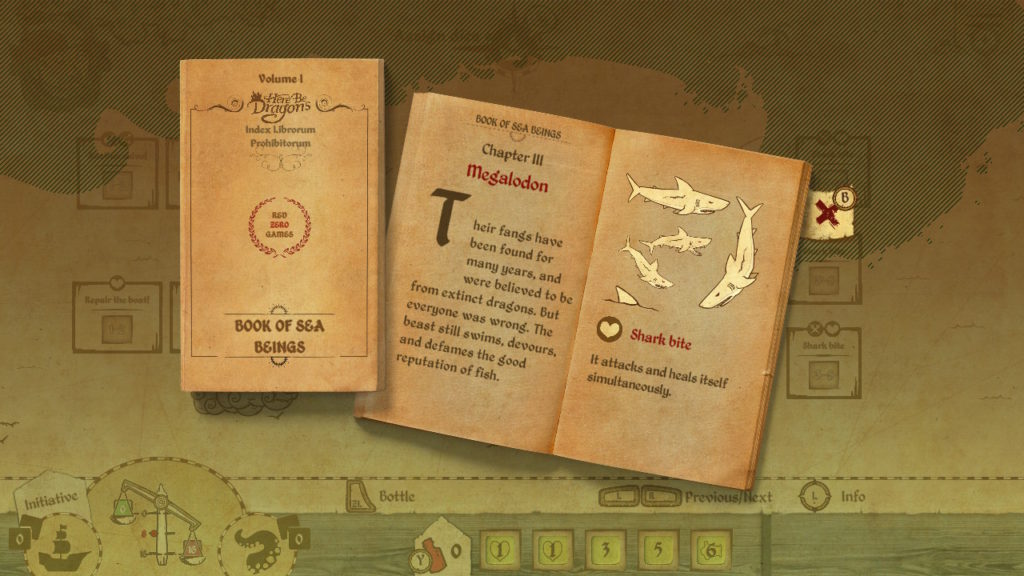
The addition of errata gives players some additional control, but there is no guarantee that dice can be manipulated to your advantage, either. If you roll all threes, and your opponent’s abilities can use 2-5 to activate, it doesn’t matter if you add or subtract a digit, those dice are still playable. Rerolling might help, but if you roll a three or four again you’re in the same boat no matter what, and if you roll a 2 or 5 you still need to have enough ink to use an errata a second time. Randomization can be a fun way to introduce challenging elements to a game, but when it is the core mechanic for the gameplay it can have the unwanted side effect of making skill or strategy irrelevant. In multiplayer games it’s not so much of an issue; many multiplayer experiences are about enhancing social gatherings rather than competition or skill, so it’s not nearly as big an issue. In a single-player game, it’s just not fun to encounter situations where you never had a chance to win. When you encounter a situation like that, there’s just this deflated feeling like you’ve wasted your time.
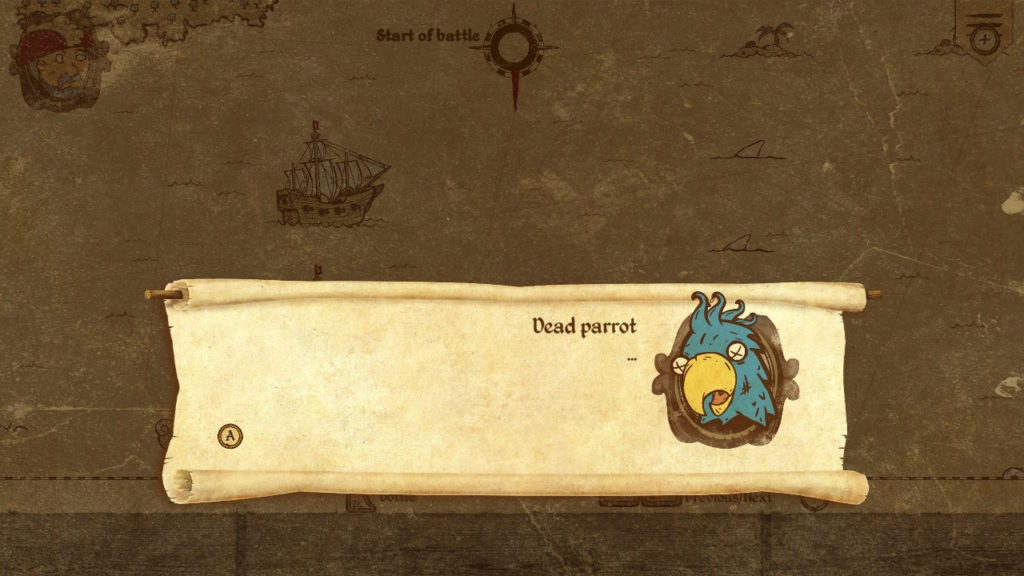
I can’t emphasize enough how much I wish I could really love this game. I adore the game’s original and quirky sense of style and sharp, funny narrative. The game mechanics that are implemented after the dice are rolled introduce some intriguing tactical options and make for some compelling strategic decision-making – if you get the right rolls. If the dice are against you, it feels like you never had a chance. And because of that, I just couldn’t enjoy all of the good Here Be Dragons has to offer. It ends up as an experience of soaring highs unable to overcome its abysmal lowest point.





Buy Here Be Dragons
Digital – $17.99
Follow Red Zero Games


The Switch Effect was graciously supplied a code for review purposes.

